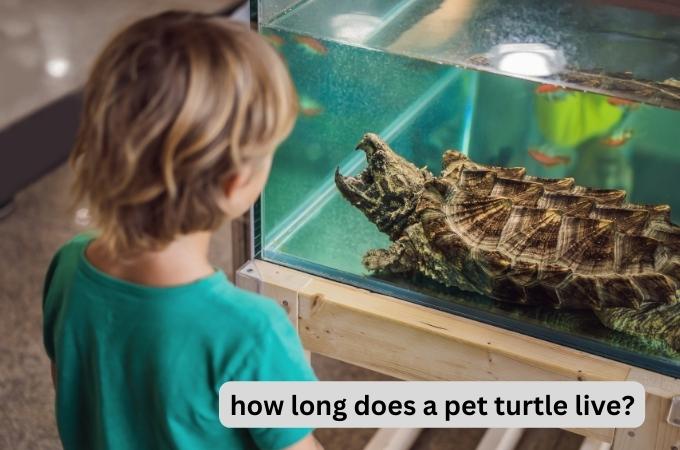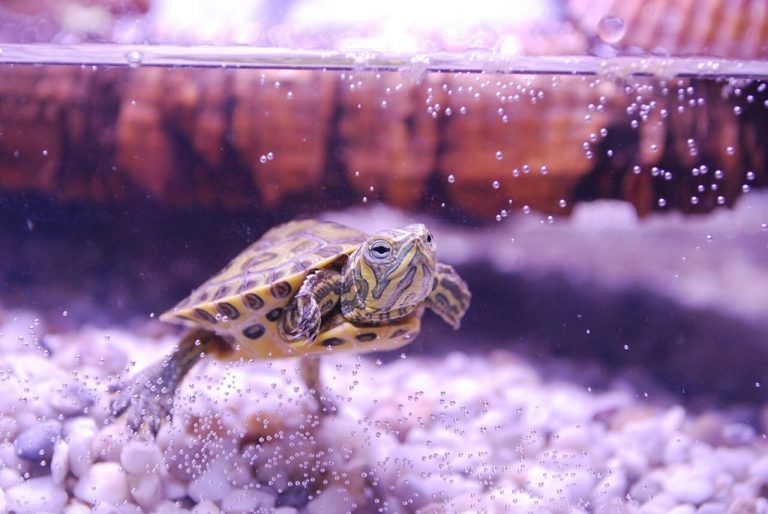how long does a pet turtle live? turtlevoice
Today we know how long does a pet turtle live. Are you considering getting a pet turtle but concerned about its lifespan? If so, then you’ve come to the right place! What can seem like a small decision between different animals to take home as your own, actually has quite an impact on life expectancy. Turtles have different lifespans depending on the type you get. In this blog post we will be exploring the various answers to this quarry and discussing what factors influence their longevity.
A pet turtle can live anywhere from 10 to 80 years, depending on the species. The average lifespan is approximately 40 years. However, proper care and a healthy diet are important for a prolonged lifespan. Good nutrition and regular veterinary visits will help ensure your pet turtle has a long life.
31 tips that help your pet box turtle live a long and healthy life:
- Provide a warm environment – temperatures between 75-80 degrees Fahrenheit are ideal.
- Offer a variety of foods such as commercial turtle diet, dark leafy greens, chopped vegetables and fruits, and insects like mealworms or crickets.
- Ensure clean water is available at all times for drinking and swimming in.
- Provide a UVB light source to enable the turtle to synthesize vitamin D3 properly.
- Keep the habitat clean and free of any parasites or bacteria.
- Keep the habitat clean and free of any parasites or bacteria.
- Offer hiding spots for your pet to feel secure and relaxed in their environment.
- Take regular trips to the vet for check-ups and treatments as needed.
- Handle your turtle regularly to maintain a good relationship and bond with them.
- Practice safe handling techniques, such as supporting all four feet and the shell when lifting a box turtle from its habitat.
- Make sure to wash your hands before and after handling, in order to keep both you and your turtle safe.
- Monitor your turtle’s behavior and contact the vet if you notice any signs of illness or distress.
- Provide plenty of space for your pet to roam and explore in its habitat.
- Maintain a regular schedule for feeding, cleaning, and providing enrichment activities for your box turtle.
- Provide a shallow dish of sand or garden soil for your pet to dig and bask in.
- Utilize natural plants, like ferns and grasses, to provide shade and add some visual interest to the habitat.
- Make sure all supplements are approved by a vet before offering them to your pet.
- Limit handling to a few minutes at a time, and avoid excessive stress or rough play.
- Discourage any aggressive behavior from children or other pets towards the turtle.
- Be aware of any potential toxins that may be harmful to your pet (e.g., insecticides, herbicides).
- Provide enrichment activities like hiding food or offering new items to explore.
- Supervise your pet box turtle when it’s outside of its habitat and ensure that it doesn’t escape or get lost.
- Limit contact with wild turtles, as they can carry diseases that can be passed on to your pet.
- Avoid using any chemical cleaners when disinfecting the habitat, as the fumes may be toxic to your turtle.
- Clean the substrate regularly and replace it every few months for optimal health and hygiene.
- Make sure to keep all sharp objects, like scissors or tweezers, out of the habitat.
- Recheck any types of new foods or supplements before offering them.
- Be mindful of the temperature when introducing new items into the habitat, as some plastics may be too hot for your pet.
- Avoid feeding tadpoles or other aquatic life, as these can carry parasites that can be harmful to your turtle.
- Be aware of potential predators, like birds or cats, that may try to attack your pet box turtle.
- Provide plenty of love and attention to keep your pet happy and healthy.
some common causes of death in pet box turtles:
Box turtles, like other species of turtle, can suffer from a number of ailments that can lead to their eventual death. Common causes include improper diet, dehydration, inadequate housing conditions, and exposure to toxins or parasites.
An improper diet can cause malnutrition which can weaken the turtle’s immune system making them more vulnerable to disease and infection. Dehydration can cause organ failure and death if left unchecked. Inadequate housing conditions, such as an enclosure that is too small or has poor ventilation, can lead to a variety of health issues including respiratory infections. Finally, exposure to toxins or parasites in the environment can also cause serious health problems and even death.
In order to prevent these causes of death, it is important to provide your pet box turtle with a proper diet, clean and comfortable housing, and an environment free from toxins or parasites. By doing so you will be ensuring that your pet has the best chance of living a long and healthy life.
What should you do if your pet box turtle becomes ill or injured:
You need to take your pet turtle to the vet. Make sure they can help reptiles, cause turtles have special needs. Once your pet has been seen by the vet and you understand the treatment plan, it’s important to make sure that you follow the instructions closely. This may include providing a warm, humid environment, special diet, and nutrition, or any other specific directives from the vet.
If your pet’s illness or injury is minor that it can be treated at home, you’ll want to make sure to create the ideal living conditions for them. Provide an area with high humidity, UVB lighting, warm temperatures, and a clean living space with plenty of hiding spots. make sure to keep up with regular cleaning and provide your turtle with fresh food and water every day.
Faqs for “how long does a pet turtle live”:
Turtles can live up to 80 years in captivity if they are provided with proper care and nutrition.
A pet turtle can live for up to two weeks without food, though it is not recommended. It is important for a pet turtle’s health and well-being that it has access to regular meals. A balanced diet of vegetables, fruits, proteins, and calcium is essential for their overall health.
For adult red-eared slider pet turtles, a tank size of at least 40 gallons is recommended. This should be supplemented with regular water changes and filter maintenance. Additionally, the top of the tank should be covered to prevent your turtle from escaping.
When your box turtle’s health begins to decline, is not eating or drinking, or stops being active and alert, it may be time to say goodbye. You should also consider euthanasia if the quality of life for your pet box turtle is deteriorating. Ultimately, it is a personal decision that you need to make based on what you believe is best for your pet.
The average lifespan of a pet box turtle is around 40 to 50 years. However, with proper care and healthy living habits, they can live even longer.

final words:
With the proper care, your pet turtle can make a great lifetime companion. However, it’s important to do your research and be prepared for the long-term commitment before you bring a turtle home. How long your turtle lives will ultimately depend on its species and whether or not it is kept in ideal conditions. But with the right set-up and care, you can enjoy many years with your new furry (or scaly) friend.




